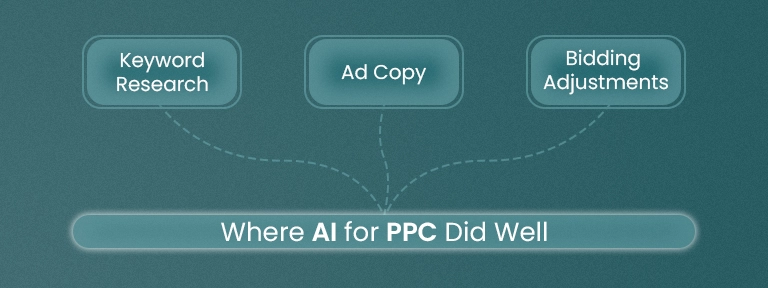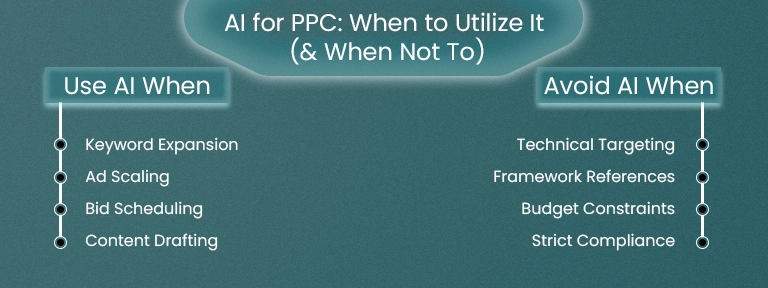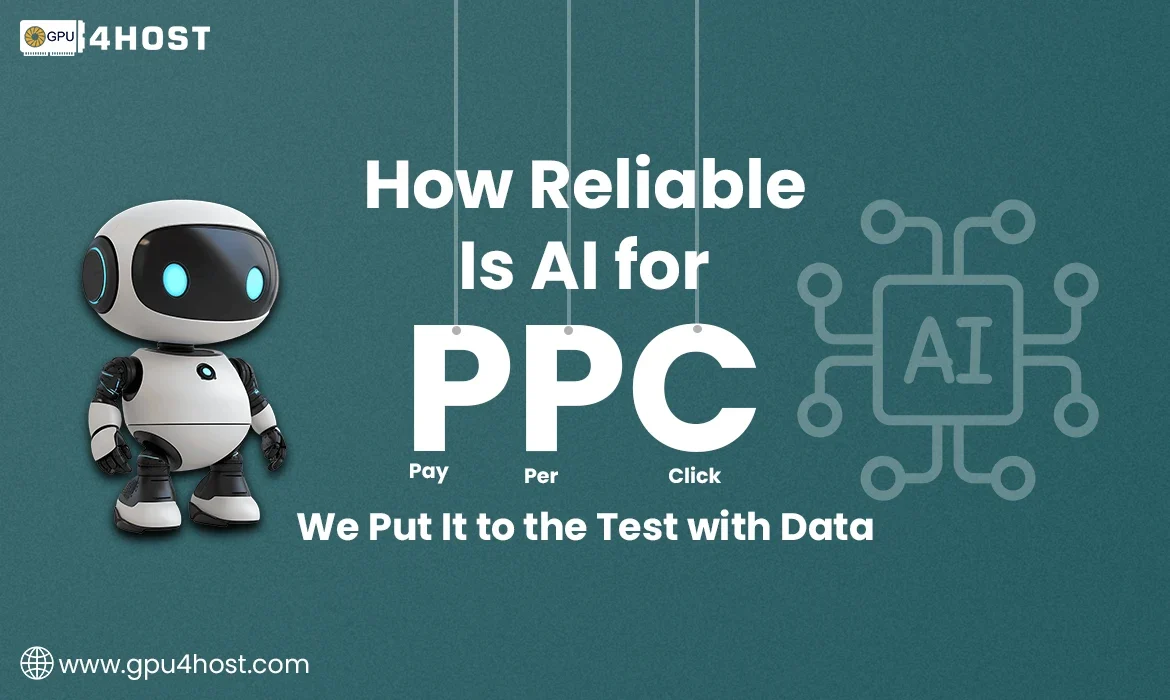AI for PPC
How Reliable Is AI for PPC? We Put It to the Test with Data
Artificial Intelligence (AI) is quickly transforming how all advertisers approach paid advertising, but how much can you really trust AI for PPC when both given budgets and performance are on the same line? With tons of available AI tools, flashy dashboards, and “smart” recommendations flooding the whole market, it’s a lot easier to wonder: Does it work, or is it all just advertisement?
To answer that query, we ran different real-world tests with the help of AI for PPC in both Facebook Ads and Google Ads, comparing its performance to human-managed campaigns and published benchmarks. In this article, we simply break down what we found, where AI outshines, and where it still falls short in driving productive, effective PPC strategies.
What Is AI for PPC, Exactly?
At its center, AI for PPC generally refers to the usage of AI to automate and optimize different key aspects of pay-per-click advertising, ranging from keyword research to ad copy generation, smart bidding, and performance examination.
Some tools are completely AI-powered, while all others combine AI with manual inputs via prompts (such as “Find low-CPC long-tail keywords” or “Generate ad copy for high CTR”). With different well-known platforms like Google Ads already adding Responsive Search Ads that dynamically change as per machine learning, AI’s robust presence in PPC is no longer an option—it’s integration into the system.
But should you depend on it completely?
The Test: Putting AI for PPC Under the Microscope
We created two similar types of PPC campaigns for the same offer—one simply managed by experienced digital marketers and one driven mainly by PPC tools with very few manual twists. Here’s how the test was well-planned:
- Platform: Facebook Ads and Google Ads
- Used Tools: ChatGPT, Meta Ads’ AI features, and a keyword research tool
- Campaign Type: Lead generation (Responsive Search Ads + Conversion Aim)
- Industries: GPU hosting, Cloud hosting, and software tools
- Duration: 1 month
Where AI for PPC Did Well

1. Quick & Broad Keyword Research
Using diverse tools such as ChatGPT and Rebrandly’s keyword addition, AI offers long-tail focus keywords and high-volume, well-known keywords in no time. It also grouped them by intent, making the whole campaign structure quicker.
This helped align ads with PPC tactics right out of the gate—no assumption, no time spent with spreadsheets.
2. Quick Ad Copy Generation
We used personalized AI prompts such as:
- “Write an effective Responsive Search Ad for GPU hosting.”
- “Write a CTA-driven headline under 30 characters for a GPU dedicated server.”
The results were usually productive, frequently increasing the expected CTR (click-through rates), mainly when personalized with brand names like GPU4HOST.
3. Smart Bidding Adjustments
Smart Bidding of a platform like Google (featured by AI) automatically manages bids according to device, time, and audience signals, sometimes exceeding manual bidding by almost 15–20%.
Where AI in the Case of PPC Fell Short
1. Shortage of Contextual Understanding
AI recommended targeting general, well-known keywords like “best web hosting” or “affordable GPU servers,” which may have driven quality traffic but do not have the conversion intent that our human-powered keyword research uncovered (for example, “NVIDIA V100 multi GPU server for AI tasks”).
This proved that depending completely on AI in the case of PPC can lead to wasted spending if you don’t layer in target audience knowledge and campaign purpose.
2. Ad Copy That Lacked Depth
Even though the initial ad copy was very fast to generate, it lacked unnecessary nuance, missing out on advantages like “TensorFlow-enhanced performance” or “PyTorch-intensive GPU clusters.”
Human-generated advertisements that mentioned particular value points, such as “Get 2x faster AI model training with NVIDIA V100 GPUs,” performed better in terms of Quality Score and lead conversions.
3. Misreading Benchmarks
The AI occasionally benchmarked itself against outdated or unrelated categories (for instance, comparing cloud hosting to e-commerce in the case of average Google Ads costs). Without a marketer’s eye to check the data, this could mislead campaign expectations.
AI for PPC: When to Utilize It (& When Not To)

Use of AI, especially for PPC, when:
- You want to boost keyword research.
- You are running responsive search ads at scale.
- You’re enhancing budget bids across different time zones.
- You need a first draft of headlines, product descriptions, or ad variations.
Avoid Depending on AI When:
- You are targeting technical niches such as a GPU dedicated server.
- You want content that references PyTorch, TensorFlow, or multi-GPU configurations.
- You are fully working with tight budgets that can’t manage experimental traffic.
- You wish to adhere to challenging compliance or tone needs.
Performance Summary: AI vs Human-Led Campaigns
The AI results in the PPC campaign offered decent outcomes in terms of CTR, maintaining an average of 4.2%, slightly above the industry average. However, when it came to affordability and lead conversions, the human-managed campaign exceeded it. The cost-per-click (CPC) was lower at ₹16.50 as compared to AI’s ₹19.00, and the lead conversion rate was significantly higher at 4.9% versus AI’s 3.4%.
In the case of user behavior, bounce rates were also more auspicious in the human campaign, signifying improved audience targeting and ad-message alignment. AI was productive at producing traffic but lacked the context and nuance that helps convert clicks into clients—mainly in challenging niches such as GPU hosting and multi GPU server plans.
Conclusion
Yes—but with strict guardrails. AI for PPC is a robust tool that can boost your advertisement campaigns if utilized promptly. It works best when united with human insight, generally in challenging niches like GPU hosting, cloud hosting, or AI-powered services utilizing NVIDIA V100 or multi GPU server configurations.
You shouldn’t let AI drive your campaigns blindly, but you should let it guide you. Think of it as a digital intern with vast energy but no genuine experience. You offer the key strategy, and AI runs the groundwork.
If you are handling a SaaS brand, a marketing agency, or a tech-based company such as GPU4HOST, mixing human creativity with AI for PPC automation is the future of smart advertising.


